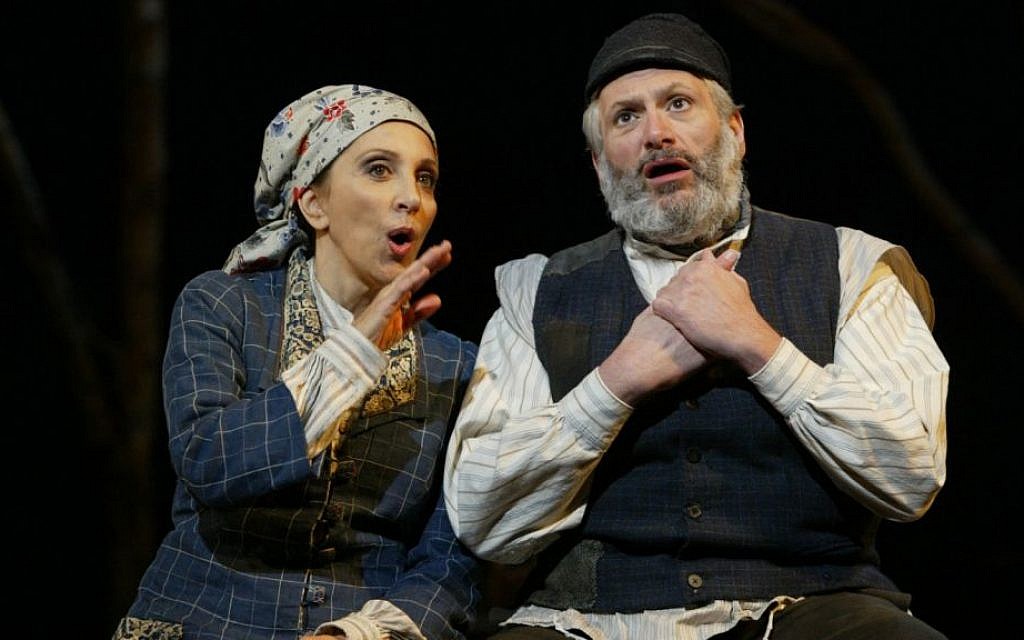Some of Broadway’s best minds were trying to say what their prospective musical was about.
It had this dairyman … and his daughters … and the czar’s soldiers … and …
But what, director Jerome Robbins asked, was it really about? Finally, someone said it was about tradition. “Write that!” Robbins said.
That story is told in “Fiddler: A Miracle of Miracles,” a richly crafted documentary at 9 p.m. Friday, Nov. 13), on PBS. The film tells of a musical some people felt would fail.
It didn’t. “Fiddler on the Roof” (shown here) won nine Tony awards and ran for 3,242 performances – at the time, the longest-running show in Broadway history. It’s had five New York revivals, six tours and a movie.
It thrived “despite a story and setting that many people thought had limited appeal,” theater historian Stanley Green wrote in “Broadway Musicals: Show by Show” (Hal Leonard Corporation, 1985).
Long before “Phantom” or “Les Mis,” this was a time when people liked musical comedies. “Fiddler” has some laughs, but it’s no comedy. “It is a dark musical,” actor Stephen Skybell says in the film.
It’s set in 1905 Russia, in a Jewish village that soldiers would soon destroy. Skeptics said it might be “too Jewish” to draw a broad audience.
Composer Jerry Bock and lyricist Sheldon Harnick had already done the Pultizer Prize-winning “Fiorello” and the breezy “She Loves Me”; now they wanted to base something on a short story by Sholom Aleichem, about Tevye, whose conversations are with God and his marrying-age daughters.
They wanted Hal Prince to direct, but Prince said Robbins – a master choreographer whose ancestral village in Poland had been eradicated by the Nazis – would better understand the subject.
Once it had an emphasis, Laurence Maslon wrote in “Broadway: The American Musical” (Bulfinch, 2004), the show was on-target. “Robbins knew that, in Oscar Hammerstein’s dictum, the first 10 minutes of a show have to spell out for the audience what the focus of the evening is going to be.”
That would be spelled out resoundingly with “Tradition,” which Maslon calls “one of the strongest openings any musical had ever seen.”
That was one of many memorable songs, including the sweet “Sunrise, Sunset” and the rousing “To Life”… plus “If I Were a Rich Man,” which “Hamilton” creator Lin-Manuel Miranda singles out in the film: “There is not a song in the Broadway canon that is more universal.”
In charge was Robbins, whom theater icon Stephen Sondheim sums up in the film as “the only genius I ever met … He could be very mean (and) I would work with him any time.”
And starring was Zero Mostel, who despised Robbins for giving names to anti-Communist investigators. (Robbins had resisted, one person says, but was afraid of being revealed as gay.)
They fought and took the show on the road to the Fisher Theatre in Detroit, in the middle of a newspaper strike … which was just as well. The unprinted reviews were lukewarm, the film says, and one said there were no memorable songs in the show.
Then “Fiddler” moved on … and began to get raves.
Is it “too Jewish”? The film shows productions by Black teens in Brooklyn and college students in Thailand. It shows others in England, Japan and Holland. And it shows Miranda’s wedding and engagement parties – a Puerto Ricans/Dominican/Austrian crowd proclaiming, “To Life.”
Then there was the movie. Director Norman Jewison feels the producers assumed he’s Jewish. He’s not, but he made “Fiddler” a classic, just as he did for movies with themes that are Christian (“Jesus Christ Superstar”) and Black (“A Soldier’s Story,” “In the Heat of the Night”).
The PBS film uses extensive scenes from the movie, from stage productions and from old and new interviews. We meet actors, like Skyball, from recent productions … and Austin Pendleton, who played a tailor in the original. “I can’t believe I was in it,” he says.
At 80, he’s an award-winning director-writer-actor. But at 24, he was part of Broadway history.
